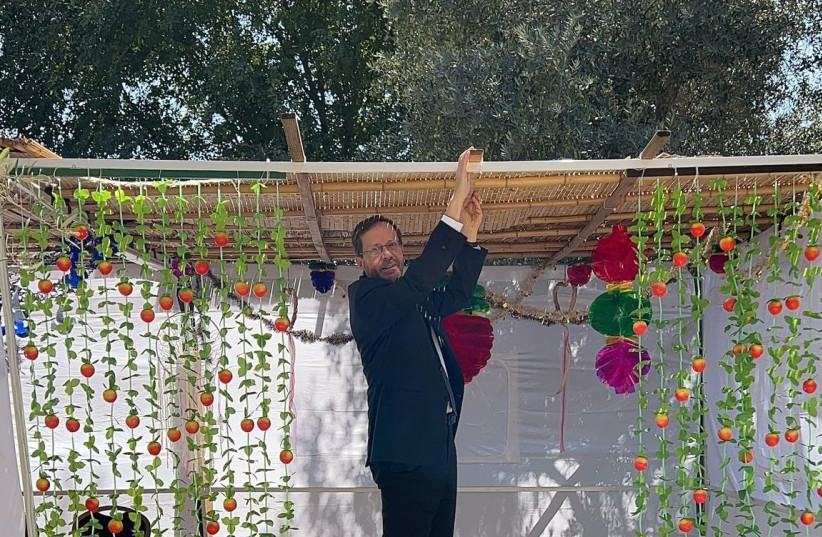Four days after Yom Kippur, we enter the holiday of Sukkot. We enter – physically – into the sukkah, which will be our “home” for the seven days (eight days outside of Israel) of the holiday, as described by Maimonides:
“How is the mitzvah of dwelling in the sukkah performed? A person should eat, drink, and live in the sukkah for the entire seven days, whether by day or night, just as one lives in his house throughout the rest of the year. And throughout the seven days, he should make his house his temporary dwelling and his sukkah permanent” (Mishneh Torah, Laws of Sukkah, Chapter 6).
Our usual, permanent lives are meant to transition for seven days from the home to the sukkah, but the sukkah itself must specifically be a “temporary dwelling,” as indicated in the Babylonian Talmud: “For all seven days, one should leave his permanent residence and live in a temporary residence” (Tractate Sukkah, page 2). As seen from the laws of the sukkah’s roofing (s’chach), it must be temporary and not permanent. Thus, we are called to transfer our permanent lives for seven days to a temporary and transient abode.
Sukkot: The Festival of Ingathering
Sukkot is also referred to in the Torah as Chag Ha’asif, the Festival of Ingathering, because it occurs during the time when Israeli farmers gather the harvest from their fields after it had dried during the summer, and store it safely for the upcoming year. This is a time of great joy, as bringing the harvest into the storehouses signifies that the farmer’s family can be nourished from the previous year’s produce during the year ahead. They feel the way a person nowadays feels when they secure a stable job with fair compensation – happy and secure in their success.
It is specifically during this time of joy that we are called upon to leave our homes and dwell in the temporary residence, the sukkah. The important message to remember during times of joy and contentment is that our lives are a constant striving for a sense of permanence in what is essentially a transient existence. There is nothing more temporary than a person or loved ones who may become physically or emotionally unwell.
WHEN WE are happy, we often push away the risks associated with existence. It was only a few days ago, on Yom Kippur, that we stood in the synagogue and recited “On Rosh Hashanah it is inscribed, and on Yom Kippur it is sealed – who will live and who will die, who will rest and who will wander, who will be humbled, and who will be exalted.” An individual who is aware of the transience of life finds it difficult to be truly happy.

Does the mitzvah of the sukkah aim to ruin our happiness? Heaven forbid! Sukkot is a time of joy, and it should remain so. The sukkah is here to help us find happiness. It provides us with an answer to the anxieties that can overshadow our joy, reminding us that human existence can maintain a sense of permanence despite its inherent transience if we remember to rely on God even in times of abundance, just as we do in times of trouble.
We all live in a secularized world where God is not a constant presence in the consciousness of many, a world that Friedrich Nietzsche called “the death of God.” This cultural state did not arise on its own; it is a situation into which humanity has evolved as it gained abundance.
The God in whom every person needed to believe in the past, when existence was precarious and dangerous, has, heaven forbid, become somewhat superfluous in a world that industrialization has made safer, with long life expectancy and a wonderful quality of life that our ancestors could hardly have dreamed of.
But this is a sweet illusion. Man is not in control of his life, despite humanity’s best efforts to make it so. If we take an honest look, even the smallest successes we have achieved did not come about entirely under our control. At every step in our lives, we need what Jewish tradition calls siata d’Shmaya, divine assistance.
Moreover, in a culture as abundant as the one we have been fortunate to have, God is not just a being to whom we cry out for help in times of trouble. We need a new religious language that does not limit God to the role of an emergency service provider but one that can express a life of happiness and peace from an understanding of God’s goodness and gratitude for all that we have received.
When we enter the sukkah, we are called upon to remember that our well-being – health, relationships, sustenance – is a gift from God. This awareness will bring us to true and genuine and joy. ■
The writer is rabbi of the Western Wall and Holy Sites.
